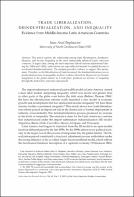JavaScript is disabled for your browser. Some features of this site may not work without it.
Mostrar el registro sencillo del ítem
Trade liberalization, deindustrialization, and inequality: evidence from Middle-Income Latin American Countries
| dc.rights.license | Licencia Creative Commons Atribución – No Comercial – Sin Derivadas (CC BY-NC-ND 4.0) | es |
| dc.contributor.author | Bogliaccini, Juan Ariel | |
| dc.date.accessioned | 2021-02-25T19:23:21Z | |
| dc.date.available | 2021-02-25T19:23:21Z | |
| dc.date.issued | 2013 | |
| dc.identifier.uri | https://hdl.handle.net/10895/1444 | |
| dc.description.abstract | This article explores the relationship among trade liberalization, deindustrialization, and income inequality in the more industrially advanced Latin American countries. It argues that, among the most important liberal reforms implemented during the 1980s and 1990s, trade reform was especially detrimental to equality because it accelerated deindustrialization. The analysis provides evidence to support this mechanism. Therefore, as the liberalization of trade increased, the deindustrialization process produced an increase in inequality. In short, evidence shows how the process of economic integration to the global market, as it took place, produced an increase in inequality through the destruction of formal employment. | es |
| dc.format.extent | 27 p. | |
| dc.format.mimetype | application/pdf | en |
| dc.language.iso | en | es |
| dc.publisher | Latin American Studies Association | es |
| dc.relation.ispartof | Latin American Research Review, vol. 48, No. 2, pp. 79-105, 2013. | es |
| dc.subject | Desigualdad social | es |
| dc.subject | América Latina | es |
| dc.title | Trade liberalization, deindustrialization, and inequality: evidence from Middle-Income Latin American Countries | es |
| dc.type | Artículo | es |
Ficheros en el ítem
Este ítem aparece en la(s) siguiente(s) colección(ones)
-
Artículos [51]


